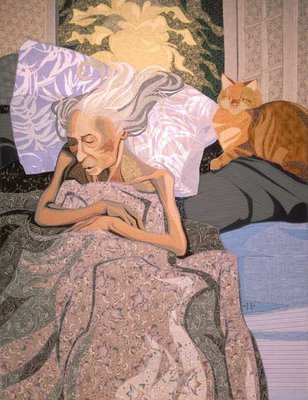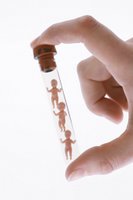 Some dozen off us went to watch 'The Gabriels' on a very chilly Thursday evening. The Finnborough is a tiny theatre perched on top of a pub somewhere behind Earl's Court. We were a little disconcerted by a strong smell of fish as we ascended the stairs, but this turned out to be the actors' dinner -- eaten on stage: a touch of realism in what was otherwise a surrealist piece of theatre. Punctuated with biblical passages read by torchlight, the action takes place in a cottage where the atmosphere is as stormy inside as the weather is outside.
Some dozen off us went to watch 'The Gabriels' on a very chilly Thursday evening. The Finnborough is a tiny theatre perched on top of a pub somewhere behind Earl's Court. We were a little disconcerted by a strong smell of fish as we ascended the stairs, but this turned out to be the actors' dinner -- eaten on stage: a touch of realism in what was otherwise a surrealist piece of theatre. Punctuated with biblical passages read by torchlight, the action takes place in a cottage where the atmosphere is as stormy inside as the weather is outside.A lesbian couple's relationship is in crisis over the care of their cystic-fibrosis suffering son (whom we never meet). Coming to visit are a gay couple involved somehow in the in-vitro conception of the son, one of whom has throat cancer and the other is an advocate of scientific research railing against bad science reporting. (I couldn't help wondering how the anti-tabloid ranting went down with critics from said papers on press night.) The twenty-something prodigal son, from a previous marriage, brings his fundamentalist Christian girlfriend to stay, throwing the household into panic and neatly turning on its head the usual parent-child relationship: mother is horrified when they refuse to share a bed.
In the meantime, one of the lesbian mums is writing a futuristic graphic novel with a subplot about the dangers of cloning. This was cleverly done with the scenes framed as part of the backdrop and the action spilling over to the foreground every now and then.
This heady mix of gender politics, genetics, sci-fi and religion always teetered on the edge of chaos but somehow it never lost the plot. The result was a truly engaging, memorable play, performed by a very strong cast. Both sides of the cloning debate were forcefully aired -- interesting and refreshing to see a science issue at the heart of a narrative in which there were so many dramatic possibilities.
Unfortunately The Gabriels's run at the Finnborough has now ended, but I hope it will be resurrected elsewhere as it deserves a bigger audience.





